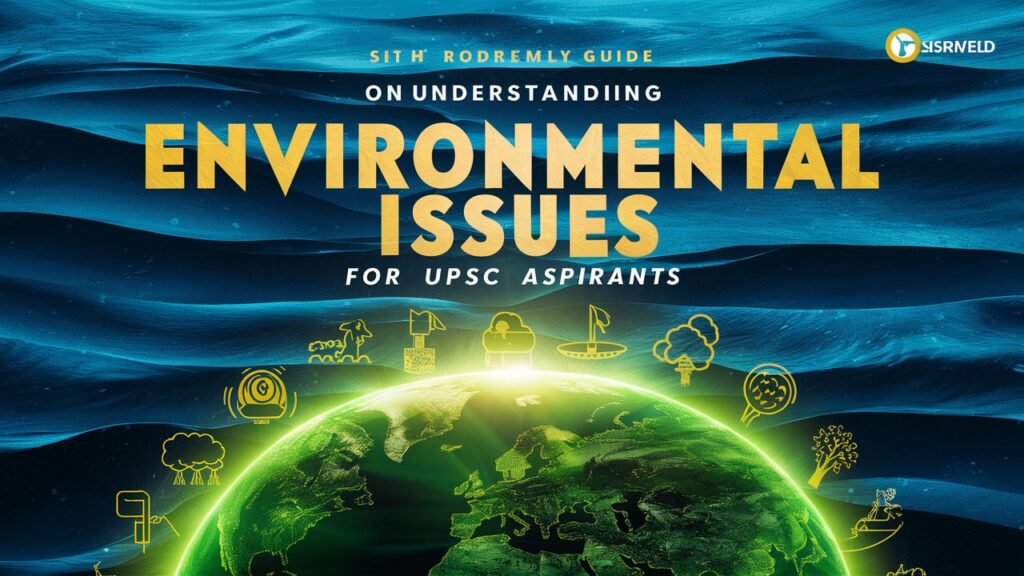
In the realm of UPSC preparation, understanding environmental issues is paramount. The Union Public Service Commission (UPSC) frequently includes questions related to environmental concerns in its examinations, making it imperative for aspirants to have a robust grasp of these topics. In this guide, we delve into what are the environmental issues notes for UPSC, providing insights, analysis, and resources to aid in your preparation.
Environmental Issues Overview
Environmental issues encompass a wide array of challenges facing our planet, ranging from pollution and climate change to deforestation and loss of biodiversity. These issues have far-reaching consequences, affecting ecosystems, human health, and socio-economic development. For UPSC aspirants, a thorough understanding of these topics is crucial for tackling both prelims and mains examinations effectively.
Key Environmental Challenges for UPSC
- Climate Change: Climate change, driven primarily by human activities such as burning fossil fuels and deforestation, poses one of the most pressing environmental threats. Rising temperatures, extreme weather events, and sea-level rise are some of its prominent effects.
- Air Pollution: With rapid industrialization and urbanization, air pollution has become a major concern globally. UPSC often asks questions related to sources of air pollution, its impact on health, and measures to mitigate it.
- Water Scarcity and Pollution: Access to clean and safe drinking water is essential for human survival. However, water scarcity and pollution jeopardize this basic necessity. UPSC examines candidates’ knowledge of water conservation strategies and water management initiatives.
- Deforestation and Loss of Biodiversity: Deforestation, primarily driven by agricultural expansion, logging, and infrastructure development, leads to habitat loss and biodiversity decline. UPSC expects aspirants to be familiar with conservation efforts and wildlife protection laws.
- Waste Management: The generation and improper disposal of solid and hazardous waste contribute to environmental degradation and health hazards. Understanding waste management practices and policies is essential for UPSC aspirants.
Comparison Table: Environmental Issues
| Environmental Issue | Description | UPSC Relevance |
|---|---|---|
| Climate Change | Global warming, extreme weather events | Frequently asked in mains and essay papers |
| Air Pollution | Sources, impact on health | Common topic in prelims and mains |
| Water Scarcity | Causes, conservation measures | Often part of current affairs and essay topics |
| Deforestation | Causes, consequences, conservation efforts | Questions in both prelims and mains |
| Waste Management | Methods, policies, recycling initiatives | Part of environmental laws and policies |
Internal Links and Further Reading
For a deeper understanding of current environmental issues, explore our comprehensive resources on daily current affairs. Stay updated with the latest developments to enhance your preparation strategy.
Mitigation and Adaptation Strategies
Addressing environmental challenges requires a multi-faceted approach involving mitigation and adaptation strategies. Mitigation involves efforts to reduce greenhouse gas emissions and minimize environmental degradation, while adaptation focuses on building resilience to the impacts of climate change.
Read Also: Current Affairs 2024 PDF: Your Ultimate Guide to Staying Informed
Conclusion
In conclusion, mastering environmental issues is essential for UPSC aspirants aiming to excel in their examinations. By understanding the intricacies of climate change, pollution, biodiversity loss, and other environmental challenges, candidates can formulate holistic solutions and contribute to sustainable development. Stay informed, stay prepared, and embark on your UPSC journey with confidence.
For more insights and tips on UPSC preparation, visit our blog for articles on GK improvement strategies, daily current affairs, and preparation strategies.
Remember, knowledge is power, and with diligent preparation, you can conquer the UPSC examination and make a positive impact on society.
For additional reading on current environmental issues and their relevance to UPSC exams, explore articles from reputable sources such as The Indian Express and insights into the salary of UPSC Chairman.
By staying informed and continuously enhancing your knowledge base, you can navigate through the complexities of UPSC examinations and emerge victorious in your pursuit of excellence.

